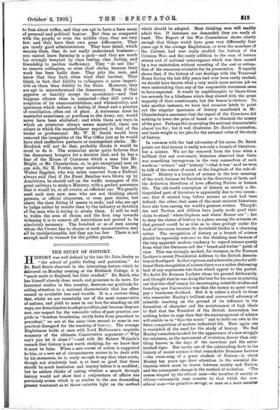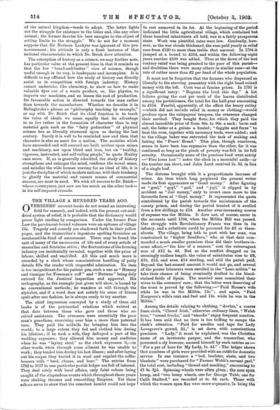THE STUDY OF HISTORY.
HISTORY was well defined by the late Sir John Seeley as "the school of public feeling and patriotism." As Dr. Emil Reich observed in the interesting lecture which he delivered on Monday evening at the Birkbeck College, it is "much made in England, but little studied." Dr. Reich, who has himself already done much, and promises to do more, for historical studies in this country, deserves our gratitude for calling attention to a national characteristic that has often caused us avoidable loss and trouble. It is a curious thing that, whilst we are essentially one of the most conservative of nations, and yield to none in our love for standing on old ways, our disinclination to adopt novelties just because they are new, our respect for the venerable relics of past practice, our pride in "freedom broadening slowly down from precedent to precedent," we are at the same time second to none in our practical disregard for the teaching of history. The average Englishman holds at once with Lord Melbourne's exquisite summary of the ultimate Conservative argument—" Why can't you let it alone ? "—and with Sir Robert Walpole's remark that history is not worth studying, for we know that it must be false. When a new course of action is suggested to him, or a new set of circumstances occurs to be dealt with by his statesmen, he is ready enough to say that what exists, though not absolutely best, is at least so good that there should be much hesitation and inquiry before it is modified ; but he seldom thinks of asking whether a search through history would not show that a conjuncture of affairs has previously arisen which is so similar to the one demanding present treatment as to throw valuable light on the method- ethod which which should be adopted. Most thinking men will readily admit this. If instances are demanded, they are ready at hand. The Report of the War Commission shows clearly enough that things would have gone very differently foil: years ago if the average Englishman, or even the members of the Cabinet, had ever really studied the history of the Crimean War, and the costly addition to the sum of human misery and of national extravagance which was then caused by a war undertaken without counting of the cost or estima- tion of the resources available for its prosecution. It equally shows that, if the history of our dealings with the Transvaal Boers during the last fifty years had ever been really studied, we should have known what a very much more serious job we were undertaking than any of the responsible statesmen seem to have expected. It would be unphilosophic to blame them too severely for a blindness which they shared with the great majority of their constituents, but the lesson is obvious. To take another instance, we have bad occasion lately to point out the singular ignorance of history manifested in Mr. Chamberlain's assurance that the repeal of the Corn-laws did nothing to lower the price of bread or to diminish the misery of the poor. Perhaps this is carrying the national characteristic almost too far ; but it well illustrates Dr. Reich's contention, and lends weight to his plea for the national value of the study of history.
In common with the best advocates of his cause, Dr. Reich points out that history is really not only a branch of literature, but a science. We are far removed from the time when a brilliant (but not over-exact) historian observed that there was something incongruous in the very connection of such words as " science " and "history,"—that it was" as if we were to talk of the colour of sound, or the longitude of the rule-of- three." History is a branch of science in the true meaning of the word, because its function is the discovery of facts, and the deduction therefrom of laws affecting Nature or human life. The old-world conception of history as merely a dis- tinguished part of literature is apparently due to two causes : one, that it existed long before science as such had been defined; the other, that some of the most eminent historians have also been among the world's greatest writers. Thucydi- des and Tacitus and Gibbon have justly made good their claim to stand where Orpheus and where Homer are "; but to deny the claims of history to a place among the sciences on that ground would be as wise as to class geology under the head of literature because Sir Archibald Geikie is a charming writer. The recognition of history as a branch of science should be especially welcome to the thinking man because of the very apparent modern tendency to regard science purely from what the Germans call the " bread-and-butter " point of view. This was strongly marked, for instance, in Sir Norman Lockyer's recent Presidential Address to the British Associa- tion at Southport. In that vigorous and admirable plea for addi- tional State recognition of science there was a rather distressing lack of any arguments but those which appeal to the pocket. No doubt Sir Norman Lockyer chose his ground deliberately, and thought that he was doing the best for his cause in pointing out that the chief reason for encouraging scientific studies and founding new Universities was that the money so spent would pay a handsome dividend. But it is rather a shock to those who remember Huxley's brilliant and unwearied advocacy of scientific teaching on the ground of its influence in the formation of character and the maintenance of high ideals to find that the President of the British Association has nothing better to urge than that the encouragement of 'science will enable us to "face the music" and to hold our own in the fierce competition of modern industrial life. Here again one is reminded of the need for the study of history. We find Huxley's sanction invoked for the appearance of a new struggle for existence, as the instrument of evolution, fiercer than any- thing known in the days of the cave-bear and the sabre- toothed tiger. But surely one of the outstanding facts in the history of recent science is that remarkable Romanes Lecture —the swan-song of a great student of Nature—in which Huxley ten years ago drew attention to the essential dis- tinction which must be drawn between society and Nature, and the consequent change in the method of evolution. "The course shaped by the ethical man—the member of society or citizen—necessarily runs counter to that which the non ethical man—the primitive savage, or man as a were member
of the animal kingdom—tends to adopt, The latter fights out the struggle for existence to the bitter end, like any other animal ; the former devotes his best energies to the object of setting limits to the struggle." We do not for a moment suppose that Sir Norman Lockyer was ignorant of this pro- nouncement: his attitude is only a fresh instance of that national characteristic to which Dr. Reich drew attention.
The conception of history as a science, we may further note, has particular value at the present time in that it reminds us that the low " bread-and-butter " view of science, though useful enough in its way, is inadequate and incomplete. It is difficult to say offhand how the study of history can directly assist us in competition with foreign industry. History cannot undertake, like chemistry, to show us how to make valuable dyes out of a waste product, or, like physics, to improve our machines, and so lessen the cost of production. Its favourable action is directed towards the man rather than towards the manufacture. Whether we describe it in Bolingbroke's phrase as "philosophy teaching by example," or say with Dr. Reich that its chief function is to teach the value of ideals, we mean equally that its advantage to us lies rather in the formation of character than in any material gain such as the "fairy godmother" of physical science has so liberally showered upon us during the last century. Surely it is well to be reminded now and then that character is also an asset for a nation. The societies which have succeeded and will succeed areluilt neither upon mines and machinery, nor upon blood and iron, but on "healthy, vigorous, instructed, and self-ruling people," to quote Huxley once more. If, as is generally admitted, the study of history strengthens and enlarges the mind, confirms the moral sense, and satisfies the wide human craving for an ideal of life, it is just the discipline of which modern nations, with their tendency to glorify the material and ensure means of commercial success, are most in need. We wish all success to Dr. Reich— whose countrymen just now are too much on the other tack— in his self-imposed crusade.



























































 Previous page
Previous page